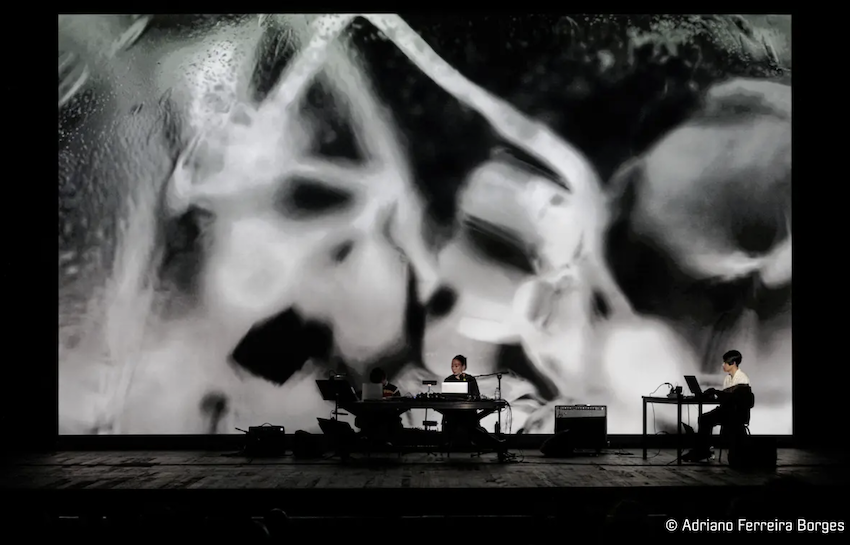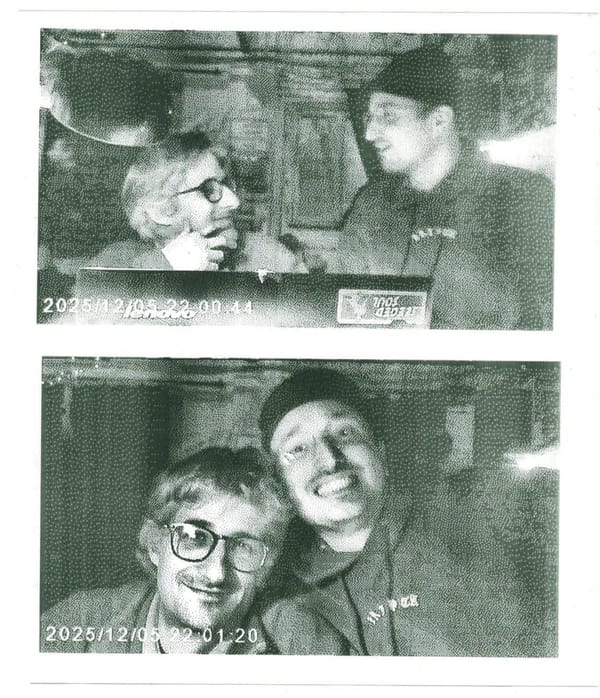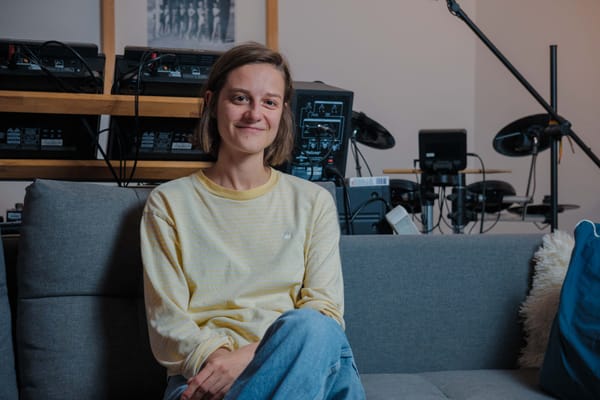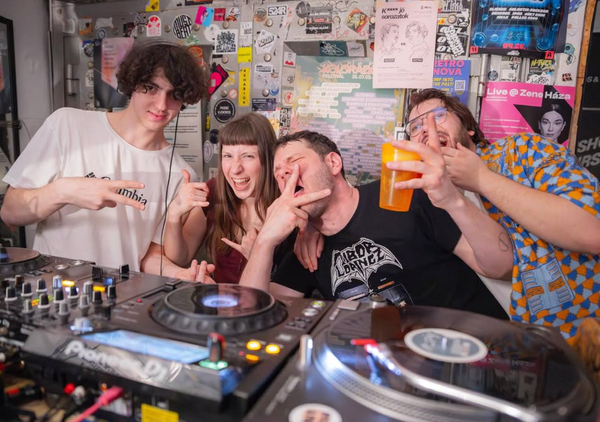Register for free to receive our newsletter, and upgrade if you want to support our work.
The Japanese musician and filmmaker Noriko Tujiko released in the past twenty plus years an impressive list of records on labels like Tomlab, Mego, FatCat, PAN and Room40. On 7th of June she performed as part of the Blaues Rauschen Festival in Witten for the first time ever to moving images created by Joji Koyama.
Noriko Tujiko was so kind to answer some questions ahead of the performance.
You were born in Osaka. From my friends in the local music scene (like Koki Emura of EM Records, Koshiro Hino of among others goat (jp) and Yuko Kureyama aka Kopy) I know a bit about the special standing of the artists from Osaka within the Japanese scene. They have the reputation of being a bit louder and wilder and also speak with a different tongue. How did you experience your upcoming in the city and the cultural scene of the Kansai region?
I left Osaka before university (when I was like 18 years old?). I was living in my cocoon – I remember I didn’t really know anything about the cultural scene other than Osaka’s big comedy culture. I started to discover a bit more after I moved to Tokyo and wondered why so many interesting cultural things are happening in Kansai, but I had never really got an answer.
Osaka dialect is really special. I love it. Often it is funnier and lighter when stories are told in Osaka-ben rather than standard Japanese. And definitely it has a bigger concrete sound or one thick sound stream when phrases are being produced and constructed by someone in a fast vivid way, in daily life. It can be incredibly fun to join these kind of conversations.
Do you feel this had a huge overall impact on your artistic path?
And still does?
Not as far as I know.
You sing in both English and Japanese. Was this a natural process for you?
I can’t make lyrics in English except really simple ones. Or maybe if it is like field recording, like recording broken English, improvised singing in a cozy way. Melody sometimes chooses the language. In my next album there will be one or two songs with english singing – one of them was translated into the English version from Japanese lyrics and it fits the melody much better.
The way you interact with your voice suggests that you perceive it as an instrument for experiments. Is that fair?
I am not sure, yes I use it as a tool but I am not at all expecting that my singing plays an experimental role in my music. Singing melody feels to me almost as opposite to experiments with sounds; I enjoy the contrast with other sounds or structures.
Do you have role models? Like for your music in general, the way you use your voice, but also when it comes to your career path?
It doesn’t matter if they are recognised or not, my close friends who are making things inspire me, sometimes artistically… but more in their attitude, I always can find something admirable and look up to.
You worked in the past with some of my favorite labels, like Tomlab, Mego, FatCat, PAN and Room40. How big is the impact of the people running a label on your works? Are you an artist that likes to discuss the work in depth with other people?
I never really discussed my work with any of the labels who I’ve worked with. I wonder if there are many musicians who talk about their music work in depth in general. All these labels you mentioned are all very respectful to my work and I really appreciate that about them. I keep in touch with most of the people who run or ran the label.
Right now AI is a topic one cannot ignore. Are you interested in the topic at all?
Yes, very much.
Do you experiment with AI as tool within your artistic process?
I have tried to use Chord AI for one track but it didn’t really help me at that time.
I read that you have three kids. I can only imagine what this means for your process, to work in a concentrated fashion on your art. On the other side, such big changes of environment often have unexpected productive consequences. How do you experience it?
The time that I can dedicate to make music, film, and so on, got really shorter (and I had only 5-6 years without children in my career). But as I have a tendency to work too fast and not take time to polish things more, it might be a good thing that I can’t progress so quickly!
Do you feel that at this point of your artistic biography you are ‘a professional’?
Never sure about it.
What is on your wish list for the years ahead?
If it is about my work: to make the film which Joji and I are currently working on. To make music for films. To finish three albums which are all here already but just waiting to be finished for a long time….
You are not only well known as a musician, you are also a recognised filmmaker. How do you feel these two endeavours interact in your work?
I feel that they are living in very different places in my head. It is hard to tell if they affect each other.
As you work in film and music, I wonder if you always know right away if an idea leads to either a song or a film follow up?
Yes. Music needs only some images, sometimes even one abstract light, to become my music. But film needs such a lot of images and words, especially as I make sort of narrative films. To me music feels more inborn, and film feels more expanding through exterior elements.
You also create music for the films of other people as well as for dance performances or art installations. Do you find it easy to give up some control of the whole, wider piece? Does it change the way you work?
I feel I shouldn’t say ‘easy’ but it is not too difficult not to control the whole thing. It feels such a freedom, I love it.
It sometimes helps my solo work, as it makes me less tired of being alone, by myself.
For how long have you been able to live from your music?
I started to sell my music soon after I started to make music in 1999/2000.
Did you start being an artist already with the idea that this could be your job or was this just something you realised along the way?
Not really.
May I ask what your parents do?
Iron factory and real estate.
How did your parents feel about you pursuing the life of an artist?
I am going to ask my mother this question next time we’re on the phone! I can already see that she will not enjoy answering these kind of questions!
But my parents were very open minded I guess – at least they never interfered or were negative.
In Europe we experience right now a dramatic change of working conditions for artists in the post pandemic climate. Inflation and also world conflicts don’t exactly cultivate an easy environment for the arts, even though we know how important the arts are in a time of crisis.
How did you personally experience the last few years, as someone living in France?
The crisis hasn’t hit my working conditions tangibly, probably I am too isolated from artistic organisations.
What is your musical ‘happy place’? The music you come back to when you need comfort?
And why do you think this particular music fulfils this purpose?
I love being in collective music lessons (violin orchestra, or guitar drams etc) of my sons. I love music and I love the place where people who just enjoy and make all these efforts in music (after school, after work) and they are connected by music, and it doesn’t really matter what music they play. It just feel so nice, safe and detoxing.
Do you have a movie that makes you feel at home? And why so?
Many movies make me feel at home. One example, just some nights ago I watched some films from Andrea Arnold, I felt at home, and I don’t know why.
You just played some gigs in January 2024 in Japan (in Kyoto, Tokyo and Fukuoka) – how did the tour go?
Very well – wonderful – I was so happy to be in Japan.
In June you’re going to present your work “Crépuscule” at Blaues Rauschen festival in Witten.
How does it feel to revisit the work after such a long time (I guess inspired by the vinyl reissue on Keplar Records)?
“Crepuscule” is not a work from long time ago, it is from 2023. So I am still feeling a bit nervous! For me it is the first time (first work) to play with images, which Joji made! The vinyl is indeed from a long time ago. I really appreciate that it is reissued and I am very happy about it (thank you Keplar Records and Tom), but I am not a person who can feel comfortable to revisit my old works.
What can we expect for this occasion?
We could feel beautiful and peaceful maybe.
TUJIKO NORIKO/JOJI KOYAMA,
played at Blaues Rauschen Festival
7.6.2024, 20:45 Uhr, Witten, Saalbau
Photo credit: Adriano Ferreira Borges
This article is brought to you by Kaput Mag as part of the EM GUIDE project – an initiative dedicated to empowering independent music magazines and strengthen the underground music scene in Europe. Read more about the project at emgui.de.
Funded by the European Union. Views and opinions expressed are, however, those of the author(s) only and do not necessarily reflect those of the European Union (EU) or the European Education and Culture Executive Agency (EACEA). Neither the EU nor EACEA can be held responsible for them.







